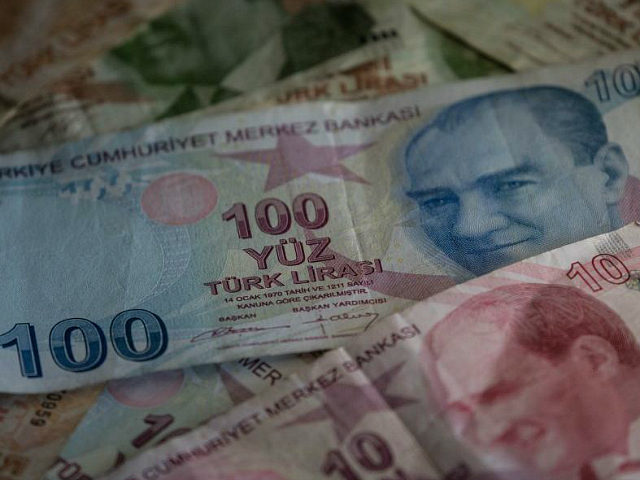Turkey’s currency, the lira, plunged to a record low on Wednesday and continued to fall Thursday following the imposition of sanctions by the United States on two Turkish officials for their roles in the detention of American pastor Andrew Brunson.
The U.S. Treasury banned Turkey’s Minister of Justice Abdulhamit Gul and Minister of Interior Suleyman Soylu from possessing property in the United States or doing business with American citizens on Wednesday in solidarity with Brunson, accused on having ties to Islamic and Marxist terrorist groups despite a notable lack of evidence.
Turkey’s economy and markets have been embattled for a while.
The Wall Street Journal reported that the lira “has lost around a quarter of its value against the dollar in 2018, as Turkey battles high inflation and debt, at a time when investors are questioning the independence of its central bank.”
According to Market Watch, the lira “recently fell 1.7% against the U.S. dollar after being essentially flat earlier in the day, bringing its loss for the year to 24%. One dollar recently bought 4.996 lira.”
Despite this, Gul and Soylu have reportedly remained defiant in the face of U.S. sanctions.
On Wednesday, Turkey’s foreign ministry said, “The decision targeting two ministers does not comply with state solemnity and cannot be explained by the concepts of law and justice” and asked the United States to reverse its “wrong decision.”
Turkey has accused Brunson of aiding the failed attempted coup against President Recep Tayyip Erdogan. He was arrested in Izmir, Turkey, in October 2016 without evidence to support the government’s charges alleging he aided armed terrorist organizations and obtained confidential government information for political and military espionage.
If convicted, Brunson faces up to 35 years in prison. Brunson denies the charges.
On Thursday, Turkey’s Finance Minister Berat Albayrak said the U.S. sanctions would have a limited impact on Turkey’s economy.
“U.S. sanctions against two Turkish ministers have fueled market concerns that other measures and countermeasures might follow,” Commerzbank AG reportedly said in a research note. “Investors do not like the political escalation.”
The sanctions target Soylu and Gul under Executive Order (E.O.) 13818, which calls for the “Blocking the Property of Persons Involved in Serious Human Rights Abuse or Corruption.” The order builds upon the Global Magnitsky Act of 2016, which allows the U.S. government to sanction individuals, companies, or corporations involved in corruption or human-rights abuses internationally and permits the seizure of their assets in the United States, prohibits them from conducting business with anyone in the U.S., and also bans them from traveling to the U.S.
“I have no other dream than to live and die in this country,” Gul reported tweeted late Wednesday, referring to Turkey. “I hold no property or money outside Turkey, in the U.S. or any other country.”
Soylu reportedly said Turkey would continue to push for the extradition of exiled Islamic cleric Fethullah Gulen, whose movement Turkey refers to as FETO and considers a terrorist organization. Erdogan says Gulen was behind the failed 2016 coup attempt. Gulen currently resides in Pennsylvania.
“We have one property in the U.S., and that is FETO [Mr. Gülen’s movement, which is listed as a terrorist organization by Turkey],” Soylu tweeted. “We will not leave him there. We will take him.”
In January, Erdogan reportedly said, “We have given the United States 12 terrorists so far, but they have not given us back the one we want. They made up excuses from thin air.” The Turkish president added, “If you’re not giving him [Gulen] to us, then excuse us, but from now on whenever you ask us for another terrorist, as long as I am in office, you will not get them.”
Adelle Nazarian is a politics and national security reporter for Breitbart News. Follow her on Facebook and Twitter.

COMMENTS
Please let us know if you're having issues with commenting.